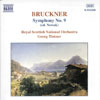Bruckner Symphony No. 9
Here is an interesting trio of Brucknerians. Two octogenarians, Georg Tintner and Gunter Wand, who have made Bruckner their particular specialism, and the septuagenarian, Herbert Blomstedt, whose Dresden recording of the Seventh Symphony was very much a front runner in its day
View record and artist detailsRecord and Artist Details
Composer or Director: Anton Bruckner
Label: Naxos
Magazine Review Date: 13/1999
Media Format: CD or Download
Media Runtime: 60
Mastering:
DDD
Catalogue Number: 8 554268

Tracks:
| Composition | Artist Credit |
|---|---|
| Symphony No. 9 |
Anton Bruckner, Composer
Anton Bruckner, Composer Georg Tintner, Conductor Royal Scottish National Orchestra |
Composer or Director: Anton Bruckner
Label: RCA
Magazine Review Date: 13/1999
Media Format: CD or Download
Media Runtime: 62
Mastering:
DDD
Catalogue Number: 74321 63244-2

Tracks:
| Composition | Artist Credit |
|---|---|
| Symphony No. 9 |
Anton Bruckner, Composer
Anton Bruckner, Composer Berlin Philharmonic Orchestra Günter Wand, Conductor |
Composer or Director: Anton Bruckner
Label: Decca
Magazine Review Date: 13/1999
Media Format: CD or Download
Media Runtime: 77
Mastering:
DDD
Catalogue Number: 458 964-2DH

Tracks:
| Composition | Artist Credit |
|---|---|
| Symphony No. 9 |
Anton Bruckner, Composer
Anton Bruckner, Composer Herbert Blomstedt, Conductor Leipzig Gewandhaus Orchestra |
| String Quintet |
Anton Bruckner, Composer
Anton Bruckner, Composer Herbert Blomstedt, Conductor Leipzig Gewandhaus Orchestra |
Author: Richard Osborne
Decca’s Leipzig recording seems clean enough, though the timpani are not always audible (piano registers as pianissimo, pianissimo barely registers at all). Like the performance, the recording delivers less than it promises to do. The best thing on the Decca disc is a sensitive and lyrical account of the sublime Adagio from Bruckner’s String Quintet. But this, after the Ninth Symphony’s great Adagio ?
Frankly, nothing can follow that. Georg Tintner makes the point in his booklet-essay on the Ninth. The Ninth, he argues, is ‘finished’ in the way that many of Schubert’s so-called unfinished works are: spiritually complete, a necessary end-point. I have long believed that all attempts to ‘complete’ the Ninth (including Bruckner’s own) were futile. Bleak, it may be, but it is true to Bruckner’s end-of-life, end-of-century vision: more Hardy’s The Darkling Thrush than Milton’s Paradise Lost.
Tintner’s account of the symphony is very fine, a disc to be purchased with confidence by those who have been investing in this (generally) excellent budget-price series. His account of the Scherzo and Trio is as quick and glintingly malevolent as Horenstein’s on his famous old 1954 Vox recording (3/55 - nla) , his reading of the outer movements logical yet searching, too. There is, for example, nothing maudlin or long-drawn about his treatment of the final Adagio, yet the sense of troubled nobility of utterance is everywhere there, right through to the slightly tremulous (though possibly inadvertent) quality of the horns’ long-held final chord.
In the Scherzo, Wand is slower than Tintner or Blomstedt; this works perfectly well in context, though, the Trio is, by any reckoning, disappointingly flaccid. This, however, is the only flaw in a performance that is otherwise remarkably similar to Tintner’s in its sense of the work’s mingled spirituality and drama but played by the Berliners with a power, spontaneity and depth of tone that neither of the rival orchestras can quite match.
This is not to say that the Berliners’ playing is inch-perfect. It isn’t. What transforms their performance, lifting it on to the very highest level, is that special visceral quality which has long been bedded deep in the orchestra’s collective unconscious. Karajan used to talk of the players taking wing and shifting direction ‘like a flock of birds’. A great conductor will allow this to happen without in any sense relinquishing his grasp of the larger argument. Wand’s is just such a performance, marvellously directed but with moments of sublime frenzy and sublime quiet. I think of the first-movement passage alluded to above, and the two passages either side of the Adagio’s terrifying C sharp minor climax.
So powerful a performance could easily produce a slightly cluttered recording. In fact, the RCA recording is first-rate, the best of the three. It is rich and immediate, yet marginally clearer in the depiction of those troublesome timpani entries than the otherwise excellent Naxos recording.
This is Wand’s third recording of the Ninth. It surpasses his own earlier Cologne and North German RSO performances (the latter recorded live in Lubeck Cathedral: a slightly risky venue). I would not further conclude that it supersedes all else that has gone before - the selected comparisons here are formidable - but I am sure it will be avidly collected by concert and radio audiences who have recently been marvelling at his Bruckner conducting in Edinburgh, London and elsewhere.'
Discover the world's largest classical music catalogue with Presto Music.

Gramophone Digital Club
- Digital Edition
- Digital Archive
- Reviews Database
- Full website access
From £8.75 / month
Subscribe
Gramophone Full Club
- Print Edition
- Digital Edition
- Digital Archive
- Reviews Database
- Full website access
From £11.00 / month
Subscribe
If you are a library, university or other organisation that would be interested in an institutional subscription to Gramophone please click here for further information.





